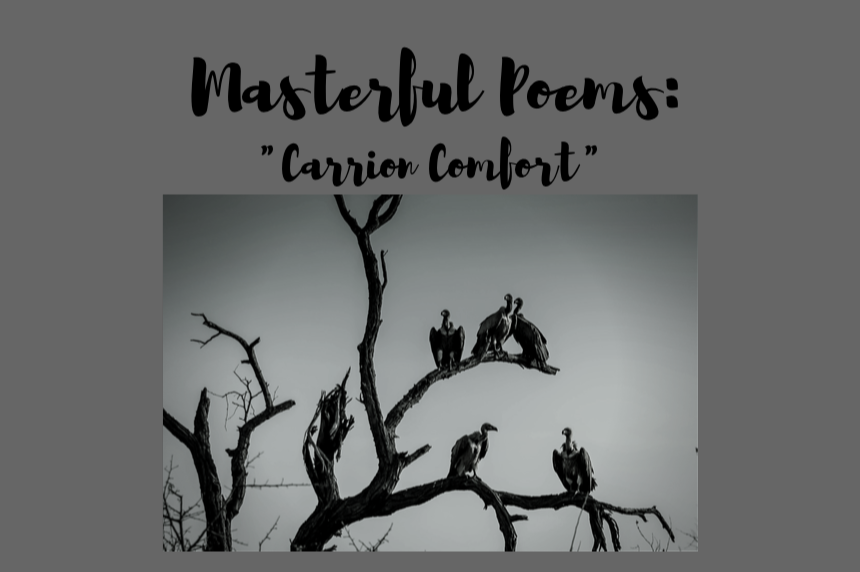Because everyone loves a good story
Masterful Poems: “Carrion Comfort”

“Not, I’ll not, carrion comfort, Despair, not feast on thee.” So begins a poem that may not be, at first glance, a very cheerful one. After all, the first half of the poem is addressed to Despair itself, describing it as dead, putrefying flesh—a feast suitable for vultures, not men.
However, when you read through to the end, you’ll find yourself surprised—as the poet himself did—at the change in perspective. Despite its dismal start, the poem is full of hope! Today I present you with one of my all-time favorite poems by my all-time favorite poet: “Carrion Comfort,” by Gerard Manley Hopkins.
Not, I’ll not, carrion comfort, Despair, not feast on thee;
Not untwist — slack they may be — these last strands of man
In me ór, most weary, cry I can no more. I can;
Can something, hope, wish day come, not choose not to be.
But ah, but O thou terrible, why wouldst thou rude on me
Thy wring-world right foot rock? lay a lionlimb against me? scan
With darksome devouring eyes my bruisèd bones? and fan,
O in turns of tempest, me heaped there; me frantic to avoid thee and flee?
Why? That my chaff might fly; my grain lie, sheer and clear.
Nay in all that toil, that coil, since (seems) I kissed the rod,
Hand rather, my heart lo! lapped strength, stole joy, would laugh, chéer.
Cheer whom though? the hero whose heaven-handling flung me, fóot tród
Me? or me that fought him? O which one? is it each one? That night, that year
Of now done darkness I wretch lay wrestling with (my God!) my God.
Now, writing about Hopkins himself would take several posts, and I hope to do that one of these days (I say that a lot, don’t I?), but it is not this day. Today I want to leap right past the fact that he was a Jesuit priest from late-19th-century England and was one of the most sincere, creative poets of his time. Nope, I won’t even tell you about him at all. Instead, let’s get right down to the nitty gritty of “Carrion Comfort.”
This, my friends, is a portrait of a man at the end of his rope. See how his tone starts off so defiant in the first three lines? He refuses to loosen his hold on the limp, fraying cord that tethers him to life and humanity. He is determined to persevere. But by line 4, the most fight he can muster up is the refusal to slip away into death.
He then, like Job, starts to question Despair, accusing it of mistreating him. After all, what had the poet ever done to deserve Its wrath? All he had wanted was to avoid Despair and run away! But instead, the poet is wrung out, slashed up, bruised, and abandoned.
The second stanza begins with one of the deepest questions in our vocabulary: “Why?”
It’s the question of Job and of every sufferer since. But while Job received his answer (graciously and frighteningly) from God Himself, the poet’s answer seems to dawn on him gradually as he looks up from his circumstances.
The reason he had felt beaten, shaken, and blown apart is because he was being tested. Satan  asked permission to sift him like wheat, and the answer was yes. But when he turned again like Peter, his heart “lapped strength, stole joy, would laugh, chéer.” How is this possible? Because although his circumstances didn’t change, his perspective did.
asked permission to sift him like wheat, and the answer was yes. But when he turned again like Peter, his heart “lapped strength, stole joy, would laugh, chéer.” How is this possible? Because although his circumstances didn’t change, his perspective did.
Looking up from the threshing floor to thank the rod that had scoured away his useless chaff, he found that it was not in Satan’s hand after all. Instead, he saw the “hero whose heaven-handling” had flung and trampled him. But rather than feeling resentful, the poet feels joy. His suffering has not been in vain. As this realization sinks in, both he and his “hero” are cheered by his renewed strength to persevere.
See, the poet had mistaken his foe; in the dark night of his soul, he had not been wrestling with Satan or Despair. He had been wrestling with God Himself. He seems as shocked as Jacob did, and yet he, too, received a blessing: the joy that comes from an accurate perspective about suffering. “The Lord gives, and the Lord takes away. Blessed be the name of the Lord.”
Source: https://www.poetryfoundation.org/poems/44392/carrion-comfort

Add a comment, and join the conversation!